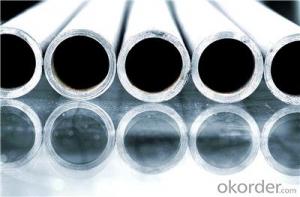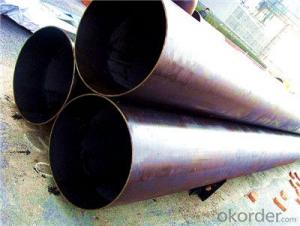Seamless Steel Pipe High Quality/Low Price
- Loading Port:
- Tianjin
- Payment Terms:
- TT OR LC
- Min Order Qty:
- 50 m.t.
- Supply Capability:
- 3000000 m.t./month
OKorder Service Pledge
OKorder Financial Service
You Might Also Like
PRODUCT DETAILS
1.Structure of Seamless Steel Pipe Description:
A large amount of Seamless Steel Pipes is offered to the clients at cost effective rates. These pipes are extremely durable, resistant to corrosion and have high tensile strength. Our pipes are used in nuclear plants, power plants, refineries and construction industry across the country. Furthermore, we are capable of providing these seamless pipes to the clients in bulk quantity.
2.Main Features of the Steel Pipe:
• High manufacturing accuracy
• High strength
• Small inertia resistance
• Strong heat dissipation ability
• Good visual effect
•Reasonable price
3.Packaging & Delivery:
| Packaging Details: | Seaworthy packages, bundles wrapped with strong steel strip |
| Delivery Detail: | 15-30 days after received 30% TT |
4.Seamless Steel Pipe Specification:
| Standard: | GB, DIN, ASTM,ASME, ASTM A106-2006, ASTM A53-2007 |
| Grade: | 10#,20#, 45#, 16Mn |
Thickness: | 8 - 33 mm |
| Section Shape: | Round |
| Outer Diameter: | 133 - 219 mm |
| Place of Origin: | Shandong, China (Mainland) |
| Secondary Or Not: | Non-secondary |
| Application: | Hydraulic Pipe |
| Technique: | Cold Drawn |
| Certification: | API |
| Surface Treatment: | factory state or painted black |
| Special Pipe: | API Pipe |
| Alloy Or Not: | Non-alloy |
| Length: | 5-12M |
| Outer Diameter: | 21.3-610mm |
5.FAQ of Seamless steel pipe:
①How is the quality of your products?
Our products are manufactured strictly according to national and internaional standard, and we take a test
on every pipe before delivered out. If you want see our quality certifications and all kinds of testing report, please just ask us for it.
Guaranteed: If products’ quality don’t accord to discription as we give or the promise before you place order, we promise 100% refund.
②How about price?
Yes, we are factory and be able to give you lowest price below market one, and we have a policy that “ for saving time and absolutely honest business attitude, we quote as lowest as possible for any customer, and discount can be given according to quantity”,if you like bargain and factory price is not low enough as you think, just don’t waste your time.Please trust the quotation we would give you, it is professional one.
③Why should you chose us?
Chose happens because of quality, then price, We can give you both.Additionally, we can also offer professional products inquiry, products knowledge train(for agents), smooth goods delivery, exellent customer solution proposals.Our service formula: good quality+good price+good service=customer’s trust.
SGS test is available, customer inspection before shipping is welcome, third party inspection is no problem.
Any question, pls feel free to contact us !
- Q:What are the factors affecting the pressure rating of steel pipes?
- The factors affecting the pressure rating of steel pipes include the thickness and quality of the steel used, the diameter and length of the pipes, the temperature and fluid being transported, as well as the design and construction of the pipe system.
- Q:How are steel pipes used in the manufacturing of marine applications?
- Steel pipes are commonly used in the manufacturing of marine applications due to their durability and resistance to corrosion. They are used for various purposes such as constructing ship hulls, offshore platforms, and underwater pipelines. These pipes provide structural support and can withstand the harsh conditions of the marine environment, making them essential components in the manufacturing process of marine applications.
- Q:What are steel pipes used for?
- Steel pipes are used for a wide range of applications in various industries. One of the most common uses of steel pipes is for transporting fluids and gases. They are extensively used in oil and gas pipelines to transport oil, natural gas, and other petroleum products over long distances. Steel pipes are also used in water supply systems, both for domestic and industrial purposes. In the construction industry, steel pipes are used for structural purposes. They provide excellent strength and durability, making them ideal for constructing buildings, bridges, and other infrastructure. Steel pipes are also used in the construction of high-rise buildings, as they can withstand heavy loads and provide stability. Steel pipes are widely used in the manufacturing industry as well. They are used in the production of machinery, equipment, and vehicles. Steel pipes are commonly used for conveying materials such as coal, ore, and grain in bulk handling systems. They are also used in the manufacturing of automotive parts, such as exhaust systems, chassis, and suspension components. Furthermore, steel pipes have various applications in the energy sector. They are used in power plants to transport steam and hot water, as well as in the production and distribution of electricity. Steel pipes are also used in the renewable energy sector, particularly in the construction of wind turbine towers and solar panel frameworks. In addition to these major applications, steel pipes are also used in plumbing systems, irrigation systems, and in the construction of fences and railings. They are highly versatile and can be customized to meet specific requirements in terms of size, thickness, and coating. Overall, steel pipes play a crucial role in many industries and are essential for transporting fluids, constructing infrastructure, and manufacturing various products. Their strength, durability, and versatility make them a preferred choice among engineers and professionals in different fields.
- Q:What is the importance of corrosion resistance in steel pipes?
- The importance of corrosion resistance in steel pipes is significant as it helps to extend the lifespan of the pipes, ensures their structural integrity, and maintains the quality of the fluid or gas being transported. Corrosion can lead to pipe failures, leaks, and contamination of the contents, resulting in costly repairs, environmental hazards, and potential safety risks. Therefore, incorporating corrosion-resistant properties in steel pipes is crucial for their long-term performance, durability, and overall efficiency.
- Q:Can steel pipes be used for transporting gases and liquids?
- Yes, steel pipes can be used for transporting gases and liquids. Steel pipes are commonly used for this purpose due to their durability, strength, corrosion resistance, and ability to withstand high pressures. Additionally, steel pipes are versatile and can be customized to meet specific requirements for different types of gases and liquids.
- Q:Can steel pipes be used for oil and gas transportation?
- Indeed, steel pipes are capable of being employed for the transportation of oil and gas. In the oil and gas sector, steel pipes are extensively utilized owing to their robustness, longevity, and capacity to withstand high-pressure environments. They are frequently employed for the conveyance of crude oil, natural gas, and related substances across extensive distances. Steel pipes exhibit exceptional resistance to corrosion and are capable of enduring extreme temperatures, thus rendering them suitable for both onshore and offshore applications. Moreover, steel pipes can be easily welded, facilitating the construction of intricate pipeline networks that efficiently transport oil and gas from production fields to refineries and distribution centers.
- Q:Can steel pipes be used for oil drilling operations?
- Yes, steel pipes are commonly used for oil drilling operations due to their strength, durability, and resistance to high pressure and extreme temperatures.
- Q:How are steel pipes used in oil and gas industry?
- Steel pipes are extensively used in the oil and gas industry for various purposes such as drilling, transporting, and processing oil and gas. They are primarily used as casing pipes, which provide structural support and prevent the collapse of boreholes during drilling operations. Steel pipes are also used for transporting crude oil and natural gas from the wellhead to processing facilities or distribution points. Furthermore, they play a crucial role in the construction of pipelines for long-distance transportation of oil and gas, ensuring efficient and reliable delivery. Additionally, steel pipes are utilized in the construction of oil and gas refineries and petrochemical plants for various processes, including fluid transportation, heat exchange, and storage.
- Q:How are steel pipes used in the construction of airports?
- Steel pipes are commonly used in the construction of airports for various purposes such as drainage systems, water supply lines, fuel pipelines, and structural supports. They provide durability, strength, and corrosion resistance, ensuring the efficient operation and safety of airport infrastructure.
- Q:What are the safety considerations while handling steel pipes?
- When handling steel pipes, some key safety considerations include wearing appropriate personal protective equipment (PPE) such as gloves, safety glasses, and steel-toe boots to protect against potential injuries. It is important to be cautious of the weight and size of the pipes, using proper lifting techniques and equipment to prevent strains or accidents. Additionally, workers should be mindful of the sharp edges and potential for cuts or punctures, ensuring they have a clear and organized workspace to minimize the risk of tripping or falling. Regular inspections of the pipes for any damages or defects are also crucial to prevent accidents and maintain a safe working environment.
1. Manufacturer Overview |
|
|---|---|
| Location | |
| Year Established | |
| Annual Output Value | |
| Main Markets | |
| Company Certifications | |
2. Manufacturer Certificates |
|
|---|---|
| a) Certification Name | |
| Range | |
| Reference | |
| Validity Period | |
3. Manufacturer Capability |
|
|---|---|
| a)Trade Capacity | |
| Nearest Port | |
| Export Percentage | |
| No.of Employees in Trade Department | |
| Language Spoken: | |
| b)Factory Information | |
| Factory Size: | |
| No. of Production Lines | |
| Contract Manufacturing | |
| Product Price Range | |
Send your message to us
Seamless Steel Pipe High Quality/Low Price
- Loading Port:
- Tianjin
- Payment Terms:
- TT OR LC
- Min Order Qty:
- 50 m.t.
- Supply Capability:
- 3000000 m.t./month
OKorder Service Pledge
OKorder Financial Service
Similar products
New products
Hot products
Related keywords































